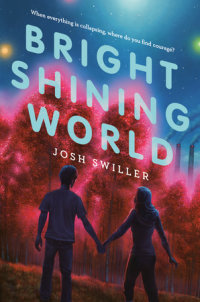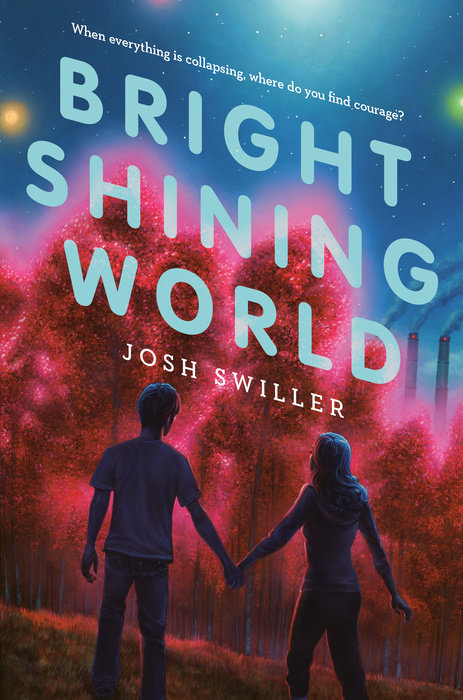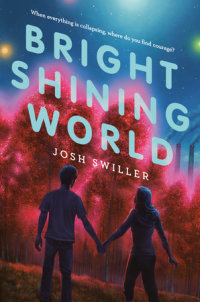Bright Shining World
Author Josh Swiller
A darkly funny thriller about one boy's attempt to unravel the mysterious phenomenon affecting students in his new town, as he finds a way to resist sinister forces and pursue hope for them all.
Wallace Cole is perpetually moving against his will. His father has some deeply important job with an energy company that he refuses to explain to Wallace who is, shall we say, suspicious. Not that his father ever listens to him. Just as…
A darkly funny thriller about one boy's attempt to unravel the mysterious phenomenon affecting students in his new town, as he finds a way to resist sinister forces and pursue hope for them all.
Wallace Cole is perpetually moving against his will. His father has some deeply important job with an energy company that he refuses to explain to Wallace who is, shall we say, suspicious. Not that his father ever listens to him. Just as Wallace is getting settled into a comfortable life in Kentucky, his father lets him know they need to immediately depart for a new job in a small town in Upstate New York which has recently been struck by an outbreak of inexplicable hysterics--an outbreak which is centered at the high school Wallace will attend.
In the new town, go from disturbing to worse: trees appear to be talking to people; a school bully, the principal, and the town police force take an instant dislike to Wallace; and the student body president is either falling for him or slipping into the enveloping darkness. Bright Shining World is a novel of resistance, of young people finding hope and courage and community in a collapsing world.
An Excerpt fromBright Shining World
One
“Rise and shine, Wallace.”
My father woke me with that hard, open-handed push on the face he liked. I blinked awake.
He said, “We’re leaving.”
I’d been having a dream about trees that could communicate with each other by flying box kites. They discussed the wind. They waved to clouds. Then a pack of aphids, falcons, and men with knives descended on them, and they screamed.
Again.
Why couldn’t I just dream about sex?
“It’s still dark out,” I said.
Dad flicked on the lamp. “Get your stuff together. We’ve got a long drive.”
We were living in a two-bedroom rental with walls made out of stale crackers. None of the overhead lights worked. In the kitchen, duct tape held together two cabinets, three windows, and four drawers. I couldn’t tell you if the decrepit white stove was gas or electric, or if it even worked--we’d never turned it on.
“I already packed up the kitchen,” Dad said.
That meant he’d grabbed his bottle opener.
“Where we going?” I asked.
“New York.”
Shoot. That was a thousand miles away. “I’m presenting my science project third period tomorrow,” I…
One
“Rise and shine, Wallace.”
My father woke me with that hard, open-handed push on the face he liked. I blinked awake.
He said, “We’re leaving.”
I’d been having a dream about trees that could communicate with each other by flying box kites. They discussed the wind. They waved to clouds. Then a pack of aphids, falcons, and men with knives descended on them, and they screamed.
Again.
Why couldn’t I just dream about sex?
“It’s still dark out,” I said.
Dad flicked on the lamp. “Get your stuff together. We’ve got a long drive.”
We were living in a two-bedroom rental with walls made out of stale crackers. None of the overhead lights worked. In the kitchen, duct tape held together two cabinets, three windows, and four drawers. I couldn’t tell you if the decrepit white stove was gas or electric, or if it even worked--we’d never turned it on.
“I already packed up the kitchen,” Dad said.
That meant he’d grabbed his bottle opener.
“Where we going?” I asked.
“New York.”
Shoot. That was a thousand miles away. “I’m presenting my science project third period tomorrow,” I protested. “Or today. Whenever it is. With Nicole.”
With nods and single-eyebrow raises, my father had approved of Nicole. Maybe mentioning her now would change his mind about leaving and we could stay in Kentucky a little longer. Until the weekend, say, when Nicole and I might go camping along the Cumberland River. Or if not until then, maybe we could stay just one more day, just one, because there was no question in my mind the announcement to Nicole of my sudden departure would lead to emotional last glances, a ride out on the dirt road behind Bueller’s pasture to that whispery grove, unbuttoned clothing, breathless quivers, breathful quivers, all different kinds of quivers, and--
“That’s not happening,” my father said. “The science project.”
“You can’t wait a day?”
“Let’s go.”
I sat up. “We’re going to present on local pollution. We worked hard on it all afternoon”--actually, we had mostly been fooling around in Nicole’s hand-me-down Civic--“about Jackduke and how it’s poisoning the river. Did you know not a single black-throated blue warbler has been seen in this county since the plant had that accident? The one right before we got here?”
Dad paused checking through a closet. “Black-throated blue warbler?”
“Black-throated blue warbler. It’s like a regular blue warbler but with more black. On the throat part.”
I liked Nicole. She was all-county in swimming, had chlorine-bleached hair and lats for days. Sometimes she spoke so fast she lost track of what she was saying, and kissing her felt a bit like an X-wing starfighter diving into the canal in the Death Star--her braces were that stupendous. Yes, she did get a bit weirded out whenever I shared my deep thoughts, and she made her own herbal teas that had pieces of grass floating in them and tasted like butt--but! These kinds of things can be forgiven, and we were almost past the “We shouldn’t be doing this” phase of hooking up.
And the next phase of hooking up? The “Let’s do this” phase? I’d only been there once, and that was by accident.
“I’m falling in love,” I said.
Dad snorted. “You’ve known her four weeks, Wallace. It’s not love.”
“It might be.”
“You don’t even know what love is.”
“Well, how can I when you rip it out of my hands?”
Dad was quiet at that. He was filling a trash bag with my clothes. Or perhaps trash--both tended to smell and to collect on the floor of my room. My life: a moldy pile in a Febreze commercial; a garbage bag thrown in the back of a truck; love, crushed by fate.
It was hopeless. I had one thing left to hit him with.
“This is not what Ma would want,” I said.
“You’re wrong,” he countered. “This is exactly what she’d want.”
“She’d want me to be alone?”
“She’d want me to do my job.”
That’s it? Dad hated when I brought up Ma. It was a direct circuit to the pain center of his brain. I’d say to him: “Hey, I had a dream about Ma on a midnight ferryboat,” and Dad would grab his head like spiders were laying eggs in there. Then he’d give me a twenty to disappear.
But not this time.
I felt a sudden gust of fear. What the hell was happening in New York?
“AC is cranked,” Dad said. “Beef jerky is bought--that gross honey-mustard kind you like. You can sleep in the truck.”
It was hard to sleep in the truck. The thumping and jostling of buckled midwestern pavement did not lend itself to sleep. The thoughts of where we were going and what I was leaving behind did not lend themselves to sleep, either. Before my iPhone died somewhere in Indiana, I tried out a few texts to Nicole, explaining my sudden departure: witness protection, a fatal illness from a secret space wormhole mission, vengeful Congolese warlords, leprosy (non-contagious, don’t worry), a retaliatory raid on the Westboro Baptist Church. But I didn’t send any of them. I’d learned from previous experiences of leaving towns abruptly (thanks, Dad) that continuing communication after a sudden departure just made things messy.
I knew that regardless of what I wrote, I would never hold Nicole again. A quiet exit was a clean exit.
Cool.
I looked out the window at the truck headlights slicing across bleached-out billboards. Our Happy Meals come with apple slices! Our lawyers sue with a smile! You’ve never seen antiques like these antiques! You will never know love, Wallace!
Cool, cool, cool.
Across the cab, my father smoked like a busted piston. As we crossed the state line into Ohio, I leaned my head against the window and watched the curtain lower forever on a short, reasonably happy, and sexually promising chapter of my life.
“No!”
I jerked awake to Dad talking on his phone. To the moment when everything began.
“How long ago? What was the last measurement?”
I looked over. Dad sat hunched against the driver’s-side door, phone pressed against his face.
“Sorry, sir. I didn’t mean to shout. That’s not what I would have--”
I carefully lowered my head back to the window.
“Yes, sir,” he said, his voice quieter, strained. “You’re right. You have been patient. We are close. A full-strength test could--”
I coughed involuntarily from the air’s carbon monoxide content, and Dad whipped his head around to look. I rubbed my nose, kept my eyes shut, pretended to be asleep--not easy with my nerves on edge.
“Good idea. It would be nice to have Marguerite there,” Dad said. “Just to head off any issues.”
Pause.
“Right, sir. There won’t be issues. Right. Thank you.”
He snapped his phone shut, hit the steering wheel, opened his lighter, lit a cigarette, dropped the lighter, grabbed the lighter, dropped the cigarette, hit the steering wheel again.
Then to himself he whispered: “Shit. He’s going for it.”
Now would be a good time to explain exactly what my father does for a living. Except that I can’t. Ronald Cole works for Jackduke Energy, and far as I can tell, he’s like a superstar engineer who parachutes in for emergency repairs when all the locals are out of their league. Like one of those wild-eyed movie geniuses who fix spaceships orbiting Mars from their bedroom.
Except he’s not an engineer. So it’s more like he’s a business-consultant genius who parachutes in when there’s an administrative breakdown. Like Steve Jobs saving Apple, both times. Except my father knows squat about running a business. He doesn’t even own a laptop. His ATM code is 1234. And he definitely doesn’t own a parachute.
What I can say is that Lawrence Hoch, Jackduke’s CEO--a man who oversees a workforce of tens of thousands and, according to websites that obsess over such things, has the kind of wealth that buys Caribbean islands and moves them if they’re not exactly where he wants them to be--this man calls my father direct when he has a problem at a power plant. And my father goes and fixes it.
How does he fix it? Somehow. That’s how.
This sounds vague and sinister, but that’s only because it is vague and sinister.
Alternate theory: My father doesn’t actually do much at the power plants. He’s a temp, an interim coach, the guy who comes in for a few weeks and keeps everyone from melting down while the fired coach slinks off and the CEO negotiates to get the hotshot new coach hired, the one with the Zen management techniques and walking desks and motivational videos clipped from action movies.
Except my father has never, far as I can tell, said kind and meltdown-preventing words. It’s not his thing. And he doesn’t own a suit.
Are you starting to get the picture? There is no picture. The man is one of those subatomic particles that disappear when you look directly at them.
He’s also my only family.
And if you’re wondering why I, a curious lad with time on his hands, didn’t just ask my father directly what he does, well, I have, many times. He didn’t answer.
Here’s an example, from somewhere in southern Ohio, an hour after that phone call.
Q (this is me, I’m the Q): Soooo, so tired. Just waking up here. Whew, what a nap. . . . So, New York, eh? What’s happening there?
A (Dad, obvs): Work.
Q: Ever thought of taking a break from work until the end of the school year? I’ll be graduated then.
A: No.
Q: Working remotely? That’s big now.
A: No.
Q: What about work is so important?
A: The work part.
Q: Care to elaborate?
A: No.
(Note that A has the warmth and eloquence of a fire door. Hence, the new and subtle approach Q, an adroit improviser and keen reader of emotional cues, takes below.)
Q: Father, do you hate me?
A: Come on, Wallace.
Q: Yes or no? It’s a straightforward question.
A: It gives me a headache.
Q: Most people would say love involves care for the person being loved. Ergo, from your lack of same, one might deduce subconscious hatred.
A: Is that a question? Someday you’ll understand. You know, this kind of talk is why principals are always on your ass.
(No answers, no girlfriend, all out of honey-mustard beef jerky, Q is now actively trying to give A a headache.)
Q: Here’s a question: What’s the point of my life?
A: Oh, God.
Q: Him? Surprising. Or her. They. I don’t mean to assume.
A: That’s not what I meant. We’re going to stop soon. We’ll rent a movie. I’m going to focus on driving now, okay?
Q: It’s not that hard. The brake is on the right.
A: It’s not-- Okay, Wallace.
Don’t drink and drive or these children will die! Sex leads to pregnancy! Free pretzels with a large sub! You’ll die alone. Alone!
We stopped at a motel on the strip of Pennsylvania that nestles between Ohio and New York like a deflated penis. Our room smelled like it was shaken out of an ashtray. Dad reneged on a promise to rent a Keanu movie, and I fell asleep to him smoking and watching a news report about natural disasters. It had been an unprecedented fall everywhere: in Vermont, a flock of geese fell out of the sky, stone dead; in Florida, a pod of dolphins crawled onto a country-club fairway in a mass suicide. All of Siberia was on fire, apparently. This had never happened before and we’re all going to die, but also a bear was walking around on its hind legs in suburban New Jersey. Just like a furry person!
I woke up sweating. We were back on the road by six. In New York State by seven. At nine, we switched off the interstate to a two-lane road and hit hill country, and as we drove through a light rain, we were often higher than the towns we passed through, and we looked down on gas stations and repair-shop roofs. I felt like a tornado, picking a target. I flung buildings down valleys and over ridges, and future people knew I had been there. Dad’s truck was an old Ford with a duct-taped bench seat, and was so large it made regular-sized cars cower out of the passing lane and onto the rumble strip. Puddles sounded long sheeeeeeits as we drove through them much too fast. As we sped through western New York, Dad glowered and did that I’m-exhaling-out-the-side-of-my-mouth-into-this-sliver-of-a-window-opening-so-you-can’t-blame-any-future-lung-troubles-on-me thing.
Our destination, he did share, was a small town in the Finger Lakes called North Homer. It had been named by classics professors, not Simpsons fans. Jackduke had a power plant two miles outside it.
“I read that Jackduke is the second-largest polluter in New York State,” I said.
“It’s worse in China,” Dad countered.
“What does anything I just said have to do with China?”
“India is just as bad. Not a lot of people know that.”
“The maple-sap harvest in the northeastern states has declined an average of eight percent a year since 2000.”
“In Delhi, they throw their trash right in the street.”
“You work for Satan.”
“Wallace, for Christ’s sake. I work for a company that provides a tangible, essential product for people. Light for their homes, heat to cook their meals. I’m not saying Jackduke is perfect. But there’s worse.”
The blur of trees by the road cleared for a moment and opened up into a broad field. It was October, but shirt-sleeve weather, and the fields were still bright green. The trees were, too. Even with the rain, it was warm.
We passed a sign saying we’d reached North Homer’s town line. The speed limit dropped to thirty. Nothing else changed, no houses or stores, just more trees and rain, blurring into a green smudge.
“So, what’s the issue with this plant?” I asked.
“I don’t know yet,” Dad answered.
I took a deep breath. “I heard you talking on the phone in Indiana. Was that Mr. Hoch?”
Dad stiffened like he’d been punched in the ribs. Bit his cigarette so hard it bent and touched the scruff on his chin. My legs started buzzing. I don’t think I’d ever so directly caught him in a lie.
“You shouldn’t eavesdrop on my conversations,” he said.
“We’re in a truck. It’s kind of hard not to.”
“It’s just that the less you know, the better.”
“Then, trust me,” I said, “I’m in great shape.”
Dad unrolled the window, spit out his chewed-up cigarette, lit another. “Okay. Okay. There’s some things I can share. Listen closely.”
“I was going to listen from a medium distance, if that’s all right.”
“Do you want to hear this?”
“Yes, go ahead.”
He exhaled smoke. “Look, North Homer is a nice little town. Has a lake. Woods.”


